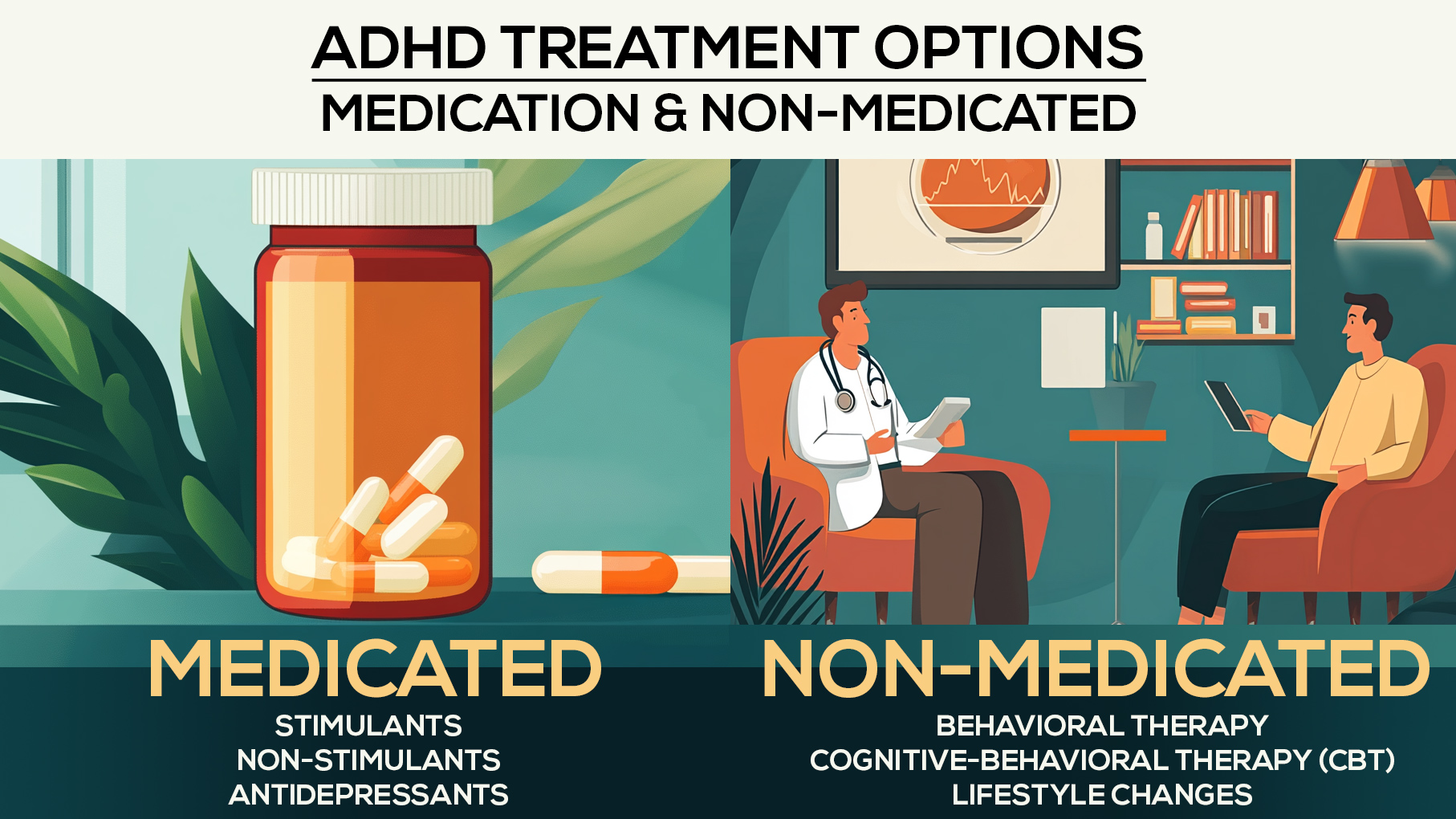ADHD treatment involves both medication-based and non-medicated approaches tailored to meet diverse patient needs. Medication often effectively manages symptoms, while non-medicated therapies provide holistic support. This article explores both, helping you make informed choices about managing ADHD.
Discover the ADHD treatment approach that fits your needs. Book an evaluation today and start your journey.
Medication-Based ADHD Treatment
Medication remains a primary approach for many with ADHD, as certain prescriptions effectively target symptoms like inattention and hyperactivity. There are two main categories: stimulants and non-stimulants.
Stimulants
Stimulants, such as methylphenidate and lisdexamfetamine, are often prescribed first due to their effectiveness in increasing focus and reducing impulsivity. According to NHS guidelines, these medications help control behavior and are taken either daily or only on school days, with regular monitoring to manage side effects.
Common Side Effects
Stimulants may cause loss of appetite, insomnia, and increased heart rate. Patients are advised to consult their specialist if side effects persist or interfere with daily life.
Non-Stimulants
Non-stimulants, including atomoxetine and guanfacine, offer alternatives for those who do not respond well to stimulants or have concerns about potential side effects. Non-stimulants may be slower to act but are effective in symptom management over time.
Here’s a top list of stimulants and non-stimulants:
| Medication Type | Medication Name | Common Brand Names | Description |
|---|---|---|---|
| Stimulants | Methylphenidate | Ritalin, Concerta, Metadate | Increases dopamine and norepinephrine levels to improve focus and control. |
| Dexmethylphenidate | Focalin | A refined form of methylphenidate, with similar effects and often fewer side effects. | |
| Amphetamine | Adderall, Mydayis | Combines amphetamine salts for a longer-lasting impact on focus and impulsivity. | |
| Dextroamphetamine | Dexedrine, ProCentra | Single-ingredient stimulant targeting hyperactivity and attention deficiencies. | |
| Lisdexamfetamine | Vyvanse | A prodrug, activated in the body for steady, controlled stimulant release. | |
| Non-Stimulants | Atomoxetine | Strattera | A selective norepinephrine reuptake inhibitor (NRI) that helps manage symptoms without stimulant effects. |
| Guanfacine | Intuniv | Initially an antihypertensive, it helps reduce impulsivity and hyperactivity. | |
| Clonidine | Kapvay | A non-stimulant that addresses hyperactivity and impulsivity, especially in children. | |
| Antidepressants | Bupropion | Wellbutrin | Primarily affects dopamine and norepinephrine, sometimes used off-label for ADHD. |
| Other Medications | Modafinil | Provigil | Sometimes used off-label for its effects on alertness and focus. |
Ready for a personalized ADHD treatment plan? Schedule your consultation today to learn about both medicated and non-medicated options.
Non-Medicated ADHD Treatment Options
Non-medicated treatments offer supportive ways to manage ADHD, often used alongside or instead of medication. Natural supplements for mild cases, options like omega-3 fatty acids, magnesium, or certain adaptogens (with professional guidance) may support mental health.
Behavioral Therapy
Behavioral therapy is especially recommended for children and adolescents, focusing on building positive behaviors and reducing negative ones. The CDC suggests involving families and educators to create a supportive environment, particularly for younger children.
Cognitive Behavioral Therapy (CBT)
CBT is valuable for older adolescents and adults, helping individuals understand how their thoughts and behaviors affect each other. It’s particularly effective in managing ADHD symptoms like impulsivity and low frustration tolerance.
Lifestyle Adjustments
Modifying daily habits, such as structured routines and limited screen time, can improve focus and reduce stress in individuals with ADHD. These changes are easy to implement and offer support alongside formal therapies.
Why Choose Express ADHD Diagnostics?
At Express ADHD Diagnostics, we make ADHD testing accessible and affordable for both children and adults. We offer cash-based services for direct pay, bypassing insurance restrictions and delivering quick results. Our sister clinic, Renu Mental Wellness Group, provides coverage-based services for those seeking insurance-only options.
- Child ADHD Diagnostic Services – $150 (Book an ADHD Test)
- Adult ADHD Diagnostic Services – $250 (Book a Test for Your Child)
- Follow-Up Consultations – $100/hr (Schedule a Consultation)
What is the Best Treatment for ADHD?
The best ADHD treatment varies depending on individual needs. For some, medication alone provides control, while others benefit from combining medication with therapy. Behavioral strategies and lifestyle modifications further complement these methods.
Final Recommendations
After an ADHD evaluation, it’s essential to consider both immediate and long-term management strategies. You may find the best results through a combination of medication, therapy, and lifestyle adjustments. Contact us today to take your first steps toward a better-managed future with ADHD.
Ready to explore your ADHD treatment options? Schedule your consultation with Express ADHD Diagnostics and receive your personalized plan. Book Your Evaluation!
Photos by NAMYNOT Inc.



